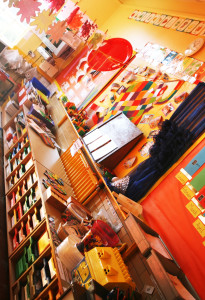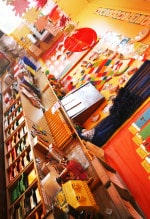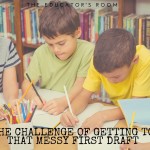 There are two studies that have survived the test in my classroom: 1) All students can relate to the reasons for revolution and the need to rebel, and 2) All students like the challenge of a good game. Thus, March Madness is an opportune time of year to combine the two. Students have engaged in class routines enough to work independently. I ascertain individual strengths and weaknesses from year long assessments, which means I know what challenges students are willing or curious to face. Game on.
There are two studies that have survived the test in my classroom: 1) All students can relate to the reasons for revolution and the need to rebel, and 2) All students like the challenge of a good game. Thus, March Madness is an opportune time of year to combine the two. Students have engaged in class routines enough to work independently. I ascertain individual strengths and weaknesses from year long assessments, which means I know what challenges students are willing or curious to face. Game on.
Students love gaming for a variety of reasons. Games offer second chances. Games that survive the test of time do so when they have clearly defined rules that can be challenged or broken. And games offer everyone a fair opportunity for winning or playing as they see fit. The virtual reality of revolution begins with set social status, worse case scenario and five days to individually climb out of chaos making real world connections along the way. Are you hooked yet?
Teenagers grapple with issues of inequity, oppression, abuse, discovery and possibility in the rawest senses. The connections to the excitement, violence and innovation of the French Revolution becomes prevalent during an interactive simulation modeled on the social structure of the Estates-General. Simultaneously, I urge students to consider the game rules relative to the value of education. Instead of assignments based on an average of point totals, the enacted pay-based grading system is of itself revolutionary. Students are presented with a menu of assignments based on dollar amounts. I publish the grade scale so that students can see for themselves how much an overall A grade costs versus an overall D. Students know that the end result is a final grade valued at $90. They work steadily toward this goal at different paces. 6/10 is no longer a grade value of 60% but 6 $ closer to $90(criterion-referenced grading). Students are accustomed to monetary incentives and quickly motivate. Those unable to accumulate $90 opt to purchase a lower grade. Few if any ever purchase failure.
The expectation to evaluate the ideological underpinnings of the French government and the economic debt crisis is symbiotic with their actual experience of taxation and social inequity. 97% of the students are denied access to legislative representation by being denied access to classroom desks. The Third Estate will have to choose between going to jail and not earning income or sitting on the floor or bringing their own chair. It is imperative that when completing assignments for income that they choose wisely. Based on Bloom’s Taxonomy, assignments based on recall or learning have a lower value than higher orders of application or creativity. Students who choose to create time lines and vocabulary lists earn a pittance but can use the pittance to design, create or analyze other aspects of the revolution for greater pay. And then I hit the students with taxes.
Taxes of 1789 were exorbitant. I fashion this simulation to give students a short experience of paying taxes while their income is low. The goal is to instruct students of the value of a grievance. Students denied access to their iPads or the freedom to leave the room without taxation learn to date and document these wrongs. Mandatory cleaning in the classroom can be construed as involuntary manual labor. By the time I present students with the template and translated collections of grievances from 1789, there is invested interest in designing a grievance of ones own. As an application of experience this assignment is worth a considerable sum.
And then there are the students who do more than break even. They get ahead. I always have students who will earn more than $90 over the course of 5 days. I set a maximum $120.00 and propose options. They can create a charity and lend to others. They can buy a grade future for the next unit of study. Inevitably social inequities lead to injustices. The paper currency issued by an assigned banker becomes too valuable to ward off stealing or counterfeiting. I offer the option of keeping their money in the bank. I set up accounts just as I set up a gradebook and encourage students to think of their returned assignments as receipts. Should someone steal their money it is possible to recover from theft but most will quickly choose the security of a bank account. I have preventative measures against counterfeiting; negative and positive outcomes of an economic crisis provide opportunities for rich discussion, meaningful questions and insightful analysis.
Standards have changed over time even though the game has not. Students who evaluate and integrate information from diverse sources, both primary and secondary earn their income at a faster rate than students who take quizzes or make lists(CCSS 12.9). As students begin to discover the value of political cartoons and art work or poetry they inevitably work to integrate their studies into their own works of art (CCSS 12.7). Of course, designing a better guillotine is a hit. We stay safe with blades that only cut carrots. The 1:1 iPad has already improved the realm of possibility for game design, video, audio etc. I have virtual and actual walls to pin protest art. A proliferation of artistic endeavors suggests that students gain understanding when they have models to follow. They become more excited to build on that understanding.
Each day I provide new lectures on revolutions of Haiti, Mexico, or other historic moments depending on general student interests. This year the interest is the Ukraine. While history remains the platform, revolutions in science and music are not off limits. Students take multiple pathways of study but always return to the same questions – How would you change an unjust government? What ideas are worth fighting for? How would you react to a revolutionary idea? The last day tends to be rewarding. Students march in proud to pay for an A in cold, hard cash. They really believe that they earned every dollar.






